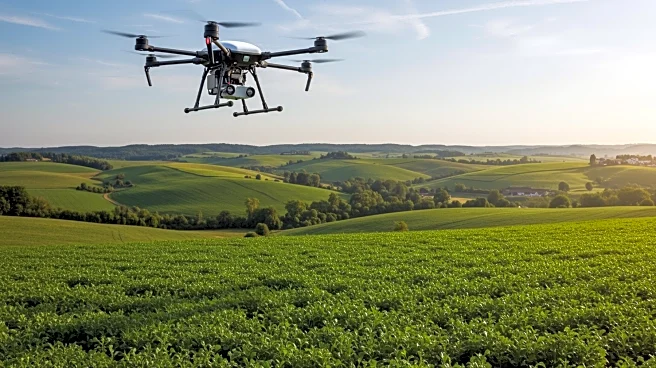What is the story about?
What's Happening?
By 2025, drones have become a critical tool in agriculture, transforming traditional farming practices through precision agriculture. These unmanned aerial vehicles (UAVs) are equipped with advanced sensor technology and imaging capabilities, allowing for real-time crop monitoring, soil analysis, and resource management. Drones are used for various applications, including aerial crop monitoring, precision farming, soil analysis, and pest and disease identification. They enable targeted application of fertilizers and pesticides, reducing environmental impact and improving crop yields. The integration of drones with satellite data and AI-driven analytics further enhances their effectiveness, providing farmers with comprehensive insights for decision-making.
Why It's Important?
The adoption of drone technology in agriculture addresses several critical challenges, including the need for sustainable farming practices and increased food production. By enabling precise monitoring and management of crops, drones help optimize resource use, reduce costs, and minimize environmental impact. This technology supports farmers in making data-driven decisions, improving productivity and resilience to environmental changes. The use of drones also facilitates compliance with regulatory requirements and enhances the traceability of agricultural products, contributing to food safety and security. As the global demand for food continues to rise, the role of drones in agriculture is expected to grow, driving innovation and efficiency in the sector.
What's Next?
The future of drones in agriculture will likely involve further integration with AI and machine learning technologies, enabling more autonomous operations and advanced analytics. Government initiatives and incentives may accelerate the adoption of drones, promoting food security and environmental monitoring. The development of eco-friendly drone models and sustainable battery technology will also be crucial in reducing the carbon footprint of agricultural operations. As the technology evolves, drones could become an integral part of smart farming systems, providing real-time data and insights to optimize every aspect of agricultural production.
Beyond the Headlines
The widespread use of drones in agriculture raises questions about data privacy and security, as well as the potential impact on employment in the farming sector. Ensuring that data collected by drones is used responsibly and securely will be essential. Additionally, as drones become more prevalent, there may be a need for new regulations and standards to govern their use in agriculture. Addressing these challenges will be important to ensure that the benefits of drone technology are realized without compromising ethical and social considerations.

















